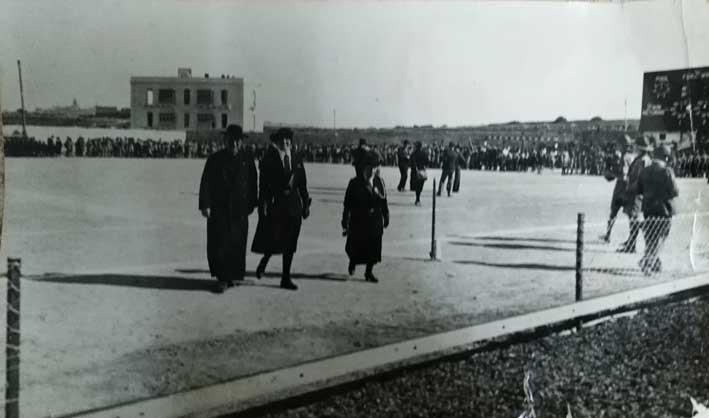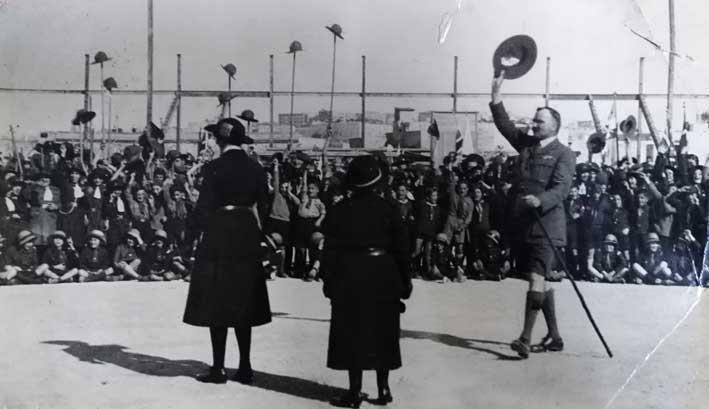Scouting began in 1907 when Robert Baden-Powell, Lieutenant-General in the British Army, held the first Scouting encampment at Brownsea Island in England.
It was on 15 September 1913 that the Malta Boy Scouts Association was formally registered by Imperial Headquarters in London as an Overseas Branch of the Boy Scouts Association.
The Girl Guides Association was set up in 1910 and the first 40 leaders enrolled at the Auberge d'Aragon on 23 December 1923. The Guide Headquarters were opened in 1937 and Malta was accepted as a full member of the World Association of Girl Guides in 1972.
The history of scouting in Malta is truly rich in events that mark its chequered history. The close connection with the founder of the Scouting Movement, Robert Baden-Powell who served in Malta as Captain during 1890-1893, is one such event.
During this period his uncle, General Sir Henry Smyth was Governor of Malta. Chief scout Baden-Powell, together with Lady Baden-Powell, visited Malta during February 1913 during their delayed honeymoon.
Scouting, also known as the Scout Movement, is a worldwide youth movement with the stated aim of supporting young people in their physical, mental and spiritual development so that they may play constructive roles in society. The history of scouting in Malta has been immortalised in the detailed and well-researched book by John A. Mizzi, Scouting in Malta: An Illustrated History.
The above-named book gives a summary and highlight of events and other notable dates of the scouts in Malta prior, during and soon after the end of the First World War. During the First World War many scouts performed many useful tasks such as coast watchers, despatch riders and hospital attendants.
The Scouts were an important part of the Second World War mobilisation plan acting as bomb spotters and guiding people to shelters, to mention just a couple of tasks they were entrusted with.
Girl Guides' wartime roles were predominantly domestic or about caring for the sick or young; they were encouraged to take charge of hospital linen, make ration bags for soldiers and help in soup kitchens and day nurseries.
Lord Baden-Powell is probably best known on our islands as the founder of the Boy Scout Movement; a movement that is still immensely popular in Malta and Gozo. He spent three years in Malta as aide-de-camp (ADC) to his uncle, Governor Henry Augustus Smyth (1890-93).
The two photos shown herein were taken at the Empire Sports Ground at Gzira. This stadium was built for Carmelo Scicluna and had a capacity of 30,000 spectators. This was a great improvement on the Mile end Stadium at Blata l-Bajda.
As can be seen in one of the photos, scoreboards are seen on the right hand side. These were installed because of the Greyhound racing which had been introduced in Malta in 1932. Changes had to be made to the sports ground to accommodate such racing.
One of the photos shows Brevet Colonel Percy Reginald Worrall, CBE, DSO cheerleading the crowd of boy scouts as he waves his hat high, while Lady Baden-Powell looks at the large crowd gathered for the occasion.
Colonel Worrall had served in the Devonshire Regiment during the First World War. Worrall in 1934 was Commander of the Order of the British Empire (CBE) for his service as Island Commissioner for the Boy Scouts in Malta. During his time, he increased Scout membership on the islands from a few hundred to 3,000.
After the First World War, Worrall and his wife lived at Farnborough Court, Hampshire, and had a daughter, Helen, and twin sons, Pyers Arthur and Anthony Charles. In 1926 Worrall travelled on the P&O liner Majala, arriving in Plymouth from Gibraltar on 5 November.
Three years later, in October 1929, the entire family of Colonel Worrall sailed as passengers on the Ranchi to Malta, where Worrall took command of the King's Own Malta Regiment. Worrall remained in Malta until 1934 when, as Brevet Colonel, he wrote a long, well-argued article about the difficulties of recruitment to the Regular Army.


Photos: Courtesy of Miss Mary Christine Scicluna
Lady Baden-Powell's visit was part of a cruise/tour of the Adriatic in 1934 which took her to Gibraltar, France, Malta, Algiers and Portugal. She had been round the world five times and logged no fewer than 613 aircraft flights.
According to http://www.spanglefish.com/olavebadenpowel she is probably the most travelled woman in the world. Guides, Scouts, Brownies and Cub Scouts from every land have felt her warmth and her deep, personal interest in them. She is a lady of rare quality and Guiding and Scouting owe her an un-repayable debt.
Kipling's words in his famous poem in the Girl Guide Annual 1970: "...she has 'talked with crowds' and 'walked with kings' yet kept 'the common touch'."
Today, part of the legacy of her life's work, the Olave Baden-Powell Society (OB-PS) supports the Mission of the World Association of Girl Guides and Girl Scouts (WAGGGS) to enable girls and young women to develop their full potential as responsible citizens of the world. OB-PS supporters invest in the future leadership by young women, who will lead their families, communities, countries and the world.